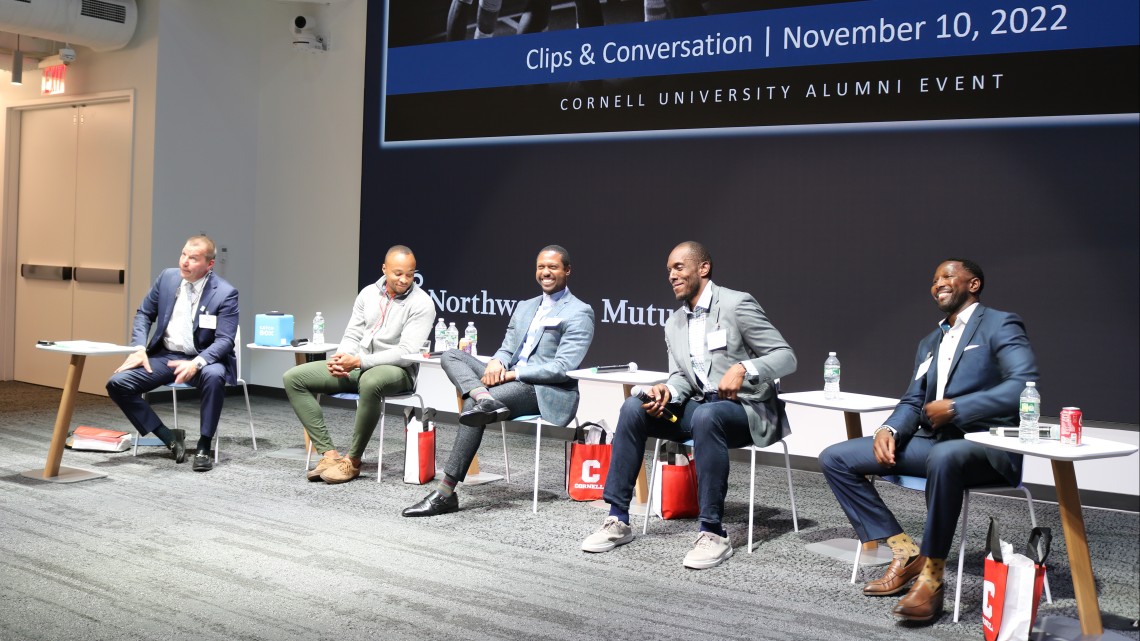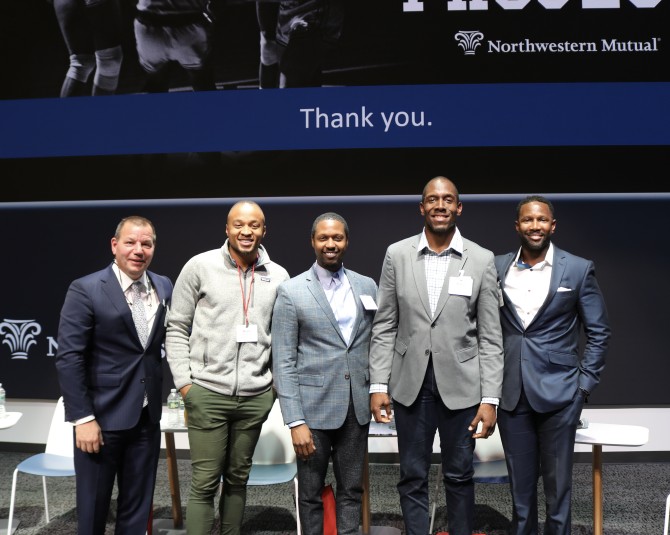
From left, Matt Russo '90, Rush Imhotep '15, Marques Zak MBA '10, Kevin Boothe '05 and Rogel Spencer, took part in a Nov. 10 event in New York City centered around the new movie "The Loyola Project."
News directly from Cornell's colleges and centers
Bringing parity, equity to the court and the boardroom
By Kathy Hovis
Cornell alumni with backgrounds in sports and business shared thoughts on diversity, equity and inclusion during a Nov. 10 event in New York City centered on a new movie about the Loyola Ramblers basketball team.
Audience members at “Clips and Conversation” viewed scenes from “The Loyola Project,” a documentary about the NCAA-champion 1963 basketball team — one of the first to break color barriers in college basketball by adding Black players to its starting roster. The evening was sponsored by Cornell Mosaic, the Cornell Entrepreneur Network and Entrepreneurship at Cornell and hosted by Northwestern Mutual.
Panelists included:
- Kevin Boothe '05, director, Management Council, National Football League
- Rush Imhotep '15, financial advisor, Northwestern Mutual
- Rogel Spencer, wealth management advisor, Noir Capital
- Marques Zak MBA '10, director, Cultural Platforms, American Express
The panel was moderated by Matt Russo '90, managing partner at Northwestern Mutual, a sponsor of the movie. Similar screenings of the movie and discussions are taking place at universities, schools and community centers across the country. The film is streaming on Paramount+.
After watching clips from the movie, panelists discussed the social environment of the 1960s and how some mindsets from that era still exist today. Panelists also focused on three main points: being “tapped” and given confidence from someone who notices your abilities; what it means to be an ally; and the existence of unwritten rules that govern both the sports and business worlds.
Boothe, who played football at Cornell, went on to play in the NFL for nine years with the Oakland Raiders and New York Giants, winning two Super Bowls, before joining the NFL’s Management Council. He said his career was definitely sparked by a coach who encouraged him.
“I remember early on a coach who told me ‘you have the chance to play at the next level,’ “ he said. “Oftentimes all we need is that word of reassurance. It reminds me to be mindful of how my words can inspire the next generation.”
Zak had a similar experience when a Morehouse College peer told him at a career fair that he had the talent needed to become a consultant. “That one conversation really changed the trajectory of my career,” he said. “And those foundational skills from consulting are skills I rely upon to this day.”
After watching a clip from the movie depicting an unwritten rule from the 1960s that kept coaches from starting more than two to three Black players — even though they were often the best players on the team — the group talked about unwritten rules that exist today.
“As a financial advisor, the unwritten rule is that since I’m a Black adviser, I only have Black clients,” Spencer said. “I sometimes just have to say ‘Hey, I do have white clients.’ I’ve always believed that when you’re good, you’re good, and you can work with anyone.”
As the panel considered clips from the movie showing the Loyola coach as an ally of his players at some times, but not always, panelists talked about how colleagues today can show allyship in the workplace.
“To be an ally is about action. You have to do something, not just to create a ‘safe space,’ ” Zak said. “The allyship of this coach was only to win, nothing else.”
Panelists said they hope the film reaches a large audience, both through the streaming service and through discussions like the one in New York City.
“The consumption of history provides a level of reconciliation and also a perspective to move forward,” Imhotep said. “Being able to see this content and have these conversations allows people to be more effective in their lives.”
Media Contact
Get Cornell news delivered right to your inbox.
Subscribe

